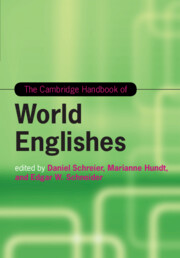Book contents
- The Cambridge Handbook of World Englishes
- Cambridge Handbooks in Language and Linguistics
- The Cambridge Handbook of World Englishes
- Copyright page
- Dedication
- Contents
- Figures
- Maps
- Tables
- Notes on Contributors
- 1 World Englishes: An Introduction
- Part I The Making of Englishes
- Part II World Englishes Old and New
- Part III Linguistics and World Englishes
- Part IV Current Challenges
- 25 Norms and Standards in World Englishes
- 26 Identity and Indexicality in the Study of World Englishes
- 27 The Politics of World Englishes
- 28 World Englishes in the Media
- 29 World Englishes and Transnationalism
- Index
- References
29 - World Englishes and Transnationalism
from Part IV - Current Challenges
Published online by Cambridge University Press: 16 December 2019
- The Cambridge Handbook of World Englishes
- Cambridge Handbooks in Language and Linguistics
- The Cambridge Handbook of World Englishes
- Copyright page
- Dedication
- Contents
- Figures
- Maps
- Tables
- Notes on Contributors
- 1 World Englishes: An Introduction
- Part I The Making of Englishes
- Part II World Englishes Old and New
- Part III Linguistics and World Englishes
- Part IV Current Challenges
- 25 Norms and Standards in World Englishes
- 26 Identity and Indexicality in the Study of World Englishes
- 27 The Politics of World Englishes
- 28 World Englishes in the Media
- 29 World Englishes and Transnationalism
- Index
- References
Summary
This chapter explores the relevance of the sociolinguistic study of transnationalism for research on World Englishes (WEs) via a review of core literature and examples of metatheoretical and empirical scholarship in sociolinguistics. In doing so, the chapter integrates discussion of research on transnationalism, which explicitly positions itself within a WEs framework, as well as research on transnationalism with a focus on English that has implications for WEs research. Before delineating a series of research trajectories, the chapter argues for the need to first recognize and attempt to do justice to the polysemy of transnationalism. Against this backdrop, it then addresses implications for WEs research of a shift away from “methodological nationalism” to transnationalism, particularly given the similarities between criticisms of “methodological nationalism” and criticisms of WEs research. Turning then to metatheoretical and empirical research on language and transnationalism from a sociolinguistic perspective, the bulk of the chapter reflects on how a transnational perspective might inform WEs research.
Keywords
- Type
- Chapter
- Information
- The Cambridge Handbook of World Englishes , pp. 676 - 701Publisher: Cambridge University PressPrint publication year: 2020



